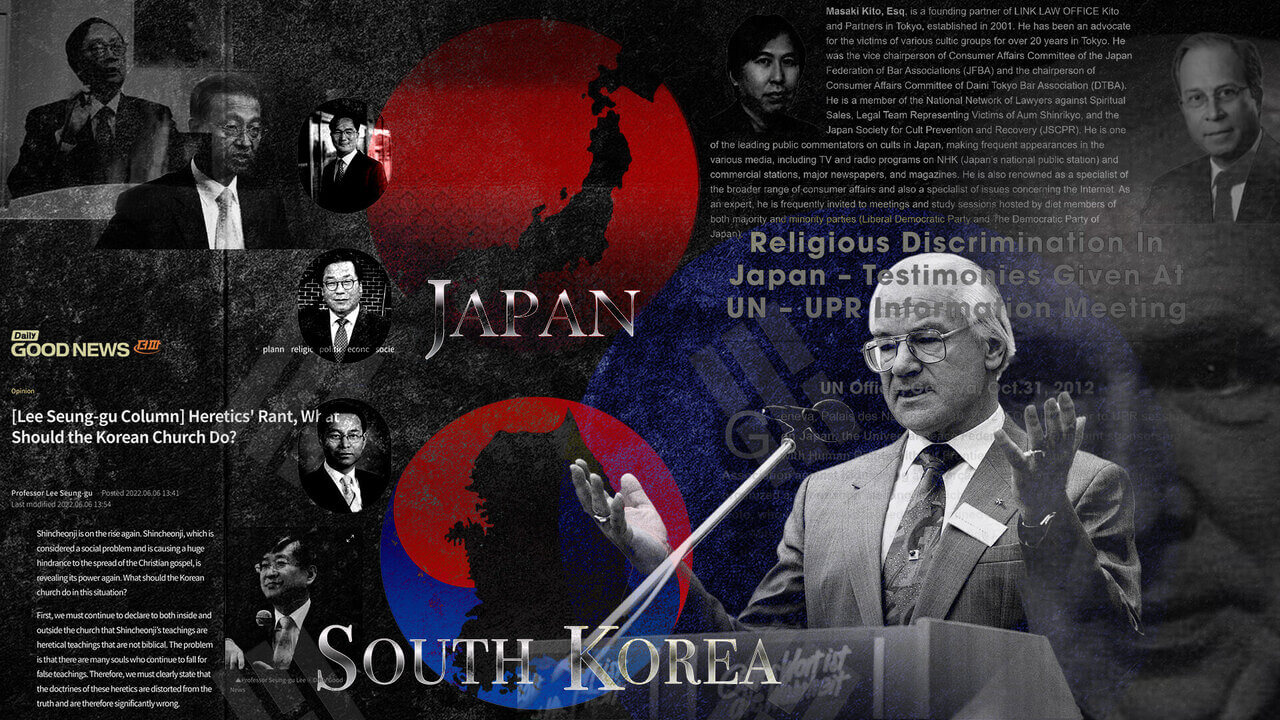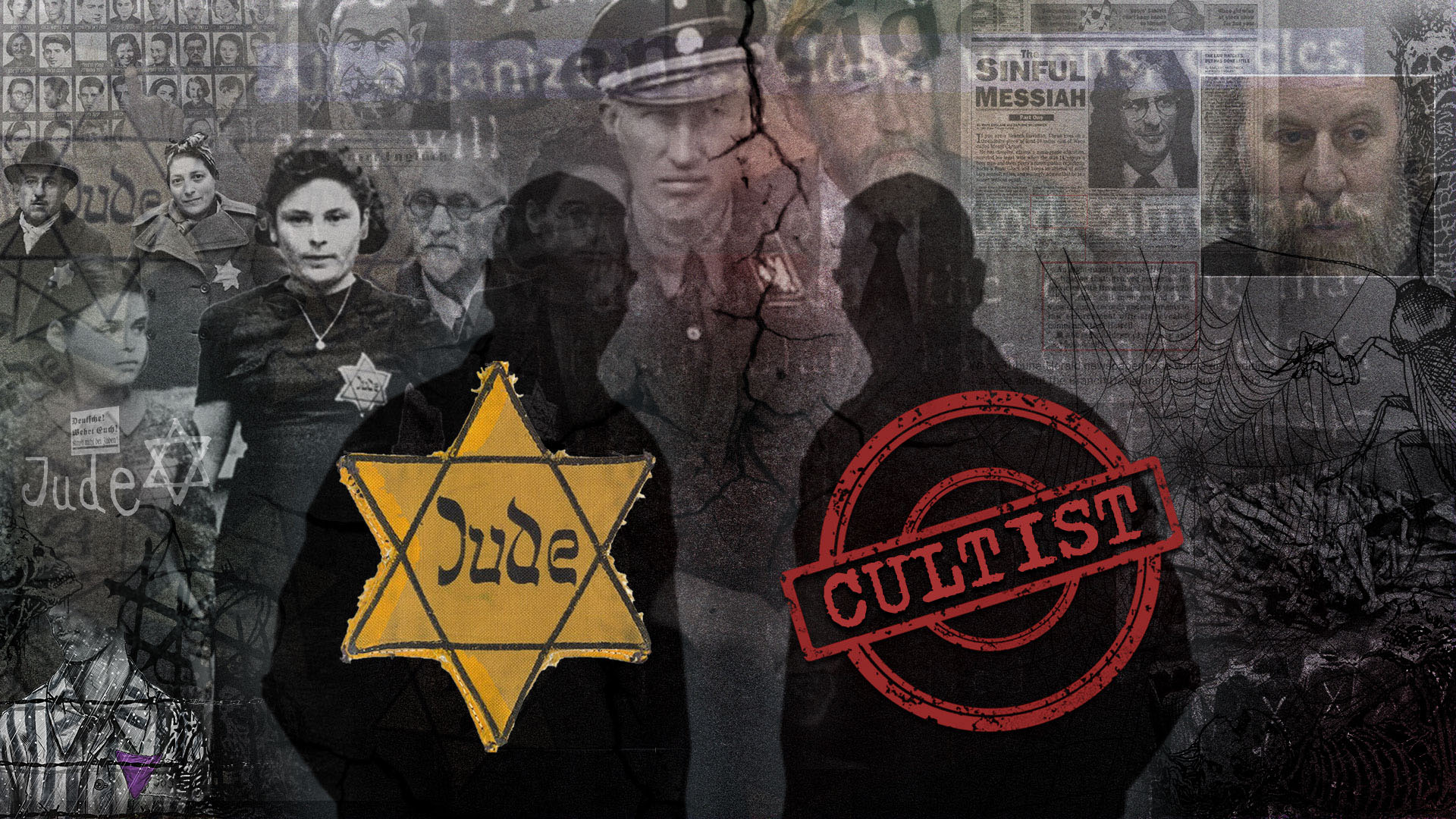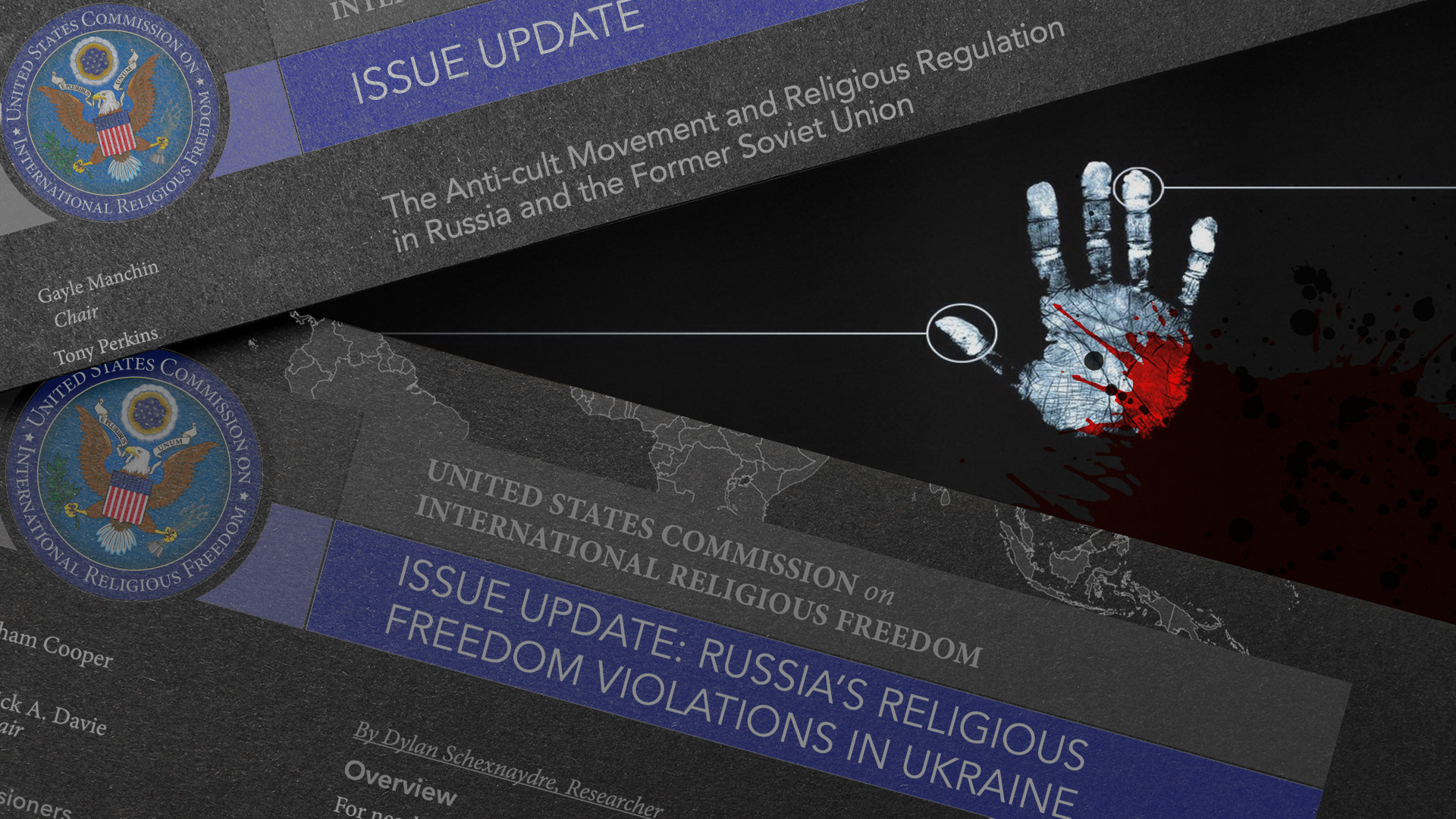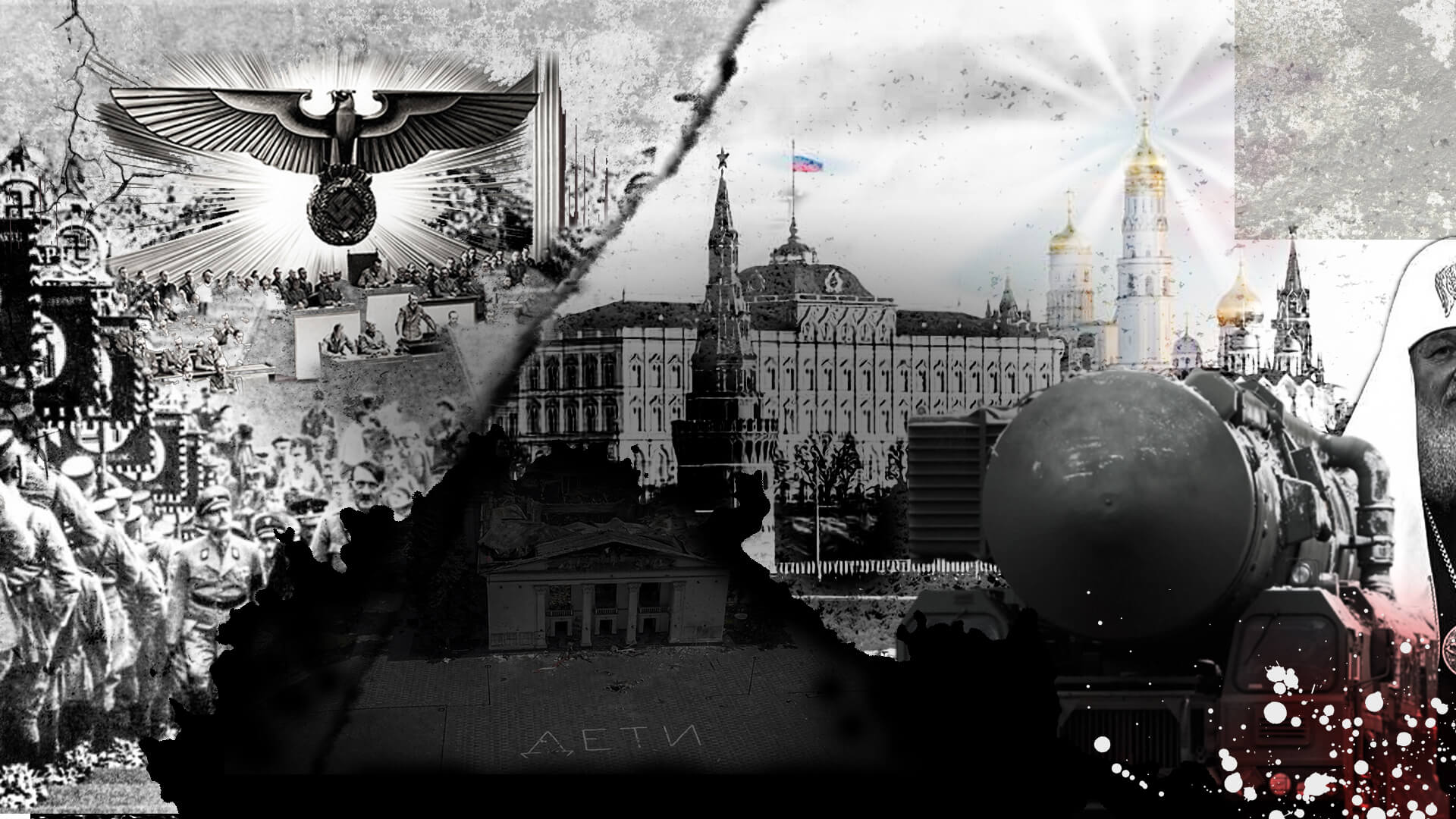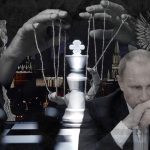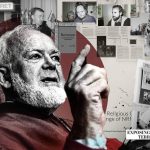Activities of the anticult movement in South Korea and Japan have repeatedly been brought to public attention by human rights advocates, lawyers, and independent human rights experts. To a large extent, those activities have been examined from the perspective of numerous documented cases of forced religious conversion, or simply put, deprogramming. It’s important to note that such a phenomenon as forced deprogramming is undoubtedly a gross violation of fundamental human rights and freedoms and must be interdicted by the global democratic community. However, in order to fully address the issue of religious intolerance and discrimination on religious grounds present in one or another region, it is necessary to examine the causes of such anti-democratic phenomena as comprehensively as possible, without downplaying the influence of many preceding events and individuals who contributed to promotion, incitement, and ideological aspect of such processes of religious intolerance.
Forced religious conversion in South Korea
For starters, let us draw your attention to the material that triggered this article. Below is an excerpt from the UN report titled “Call for input: Report on eliminating intolerance and discrimination based on religion or belief and the achievement of Sustainable Development Goal 16 (SDG 16).” This report outlines the issue of violence and discrimination against members of Shincheonji in South Korea 1:
“In democratic countries, deprogramming only survives in South Korea, with thousands of cases. Victims are abducted and confined by the parents, and deprogrammed by Protestant pastors who work as professional deprogrammers. A dozen so-called cults are victims of deprogramming but the most targeted, with more than 2,000 cases, is Shincheonji. In 2018, a female Shincheonji member, Gu Ji-In (1992–2018), died as a cause of the second attempt at deprogramming her, after the first had failed. As she tried to escape, her parents bound and gagged her, causing suffocation. As a result, members of Shincheonji and other groups took to the street in massive demonstrations.
The U.S. Department of State reported in its Report on Religious Freedom published in 2019, and covering events of 2018, that, ‘In January, following reports that parents killed their daughter while attempting to force her to convert from what the parents viewed as a cult to their own Christian denomination, 120,000 citizens gathered in Seoul and elsewhere to protest against coercive conversion, reportedly conducted by some Christian pastors. The protestors criticized the government and churches for remaining silent on the issue and demanded action’ (U.S. Department of State 2019).
Nevertheless, deprogramming continues, with numerous instances of violence and even attempts to confine abducted Shincheonji members in psychiatric hospitals. In 2019 only, Shincheonji has documented 116 cases of attempted deprogramming. Although inclined to regard them as ‘family affairs’ they should not interfere with, Korean courts sometimes convict the parents — despite their adult children’s reluctance to denounce them in the context of a society where family is paramount — but never the deprogrammers, who normally do not participate in the kidnappings but instigate them, pocket sums that are in some cases exorbitant for their services, and are clearly accomplice to the unlawful detention and violence.”
Let’s recall that the figures presented in this excerpt of the report reflect the situation in only one region and pertain to just one religious group. In addition to this group, there are many other groups in the same country that have similarly become targets of anticult deprogrammers — Protestant pastors.
It is also worth noting that deprogrammers among pastors of the Korean Protestant Church have found a way to avoid responsibility for their crimes. They play a role of consultants to family members, essentially taking on an instigating position, while remaining on the sidelines when the victim is abducted. After consultations with the pastors, family members abduct their relatives themselves, after which the pastors proceed with the deprogramming process. Since religion in Korea is considered a “family matter,” this not only excludes legal intervention in cases of human rights violations, but also ostensibly gives journalists an excuse not to interfere or publicize these brutal violations, allowing pastors-deprogrammers to escape responsibility.
Below, in the screenshot, we provide a list of representatives of the Korean Christian Heresy Counselling Center — one of the centers directly involved in consulting family members and organizing and implementing the process of forced religious conversion in South Korea 2:
![Screenshot from the “Jesus114” website ⓒ «한국기독교이단상담소협회» [2]](https://actfiles.org/wp-content/uploads/2024/12/1-1024x686.jpeg)
The next similar source is the website of the International Cult Counselor Online Academy 3.
![Screenshot from Jesus112 website ⓒ “국제이단상담사 온라인아카데미” [3]](https://actfiles.org/wp-content/uploads/2024/12/2-3-1024x576.jpg)
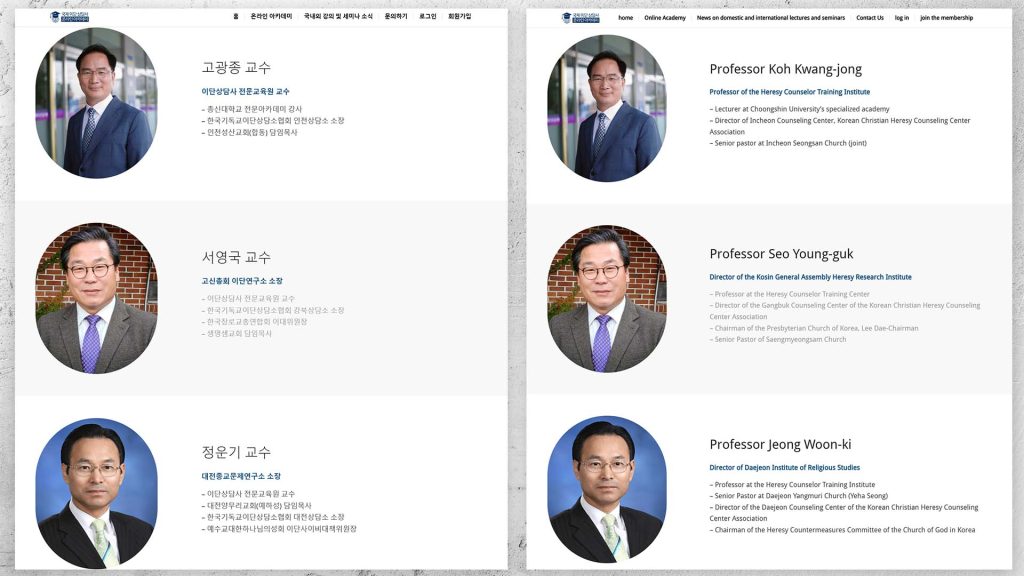
* In Christianity, “heresy” refers to teachings or views that are considered false and dangerous from the perspective of Christian apologists. Anticultists have assigned the same meaning to the terms “sect” and “cult,” using these derogatory labels to stigmatize all those they deem undesirable, regardless of their religious or social orientation.
As stated in the Munting Nayon journal 4, religious persecution and human rights violations occur not only on the part of the Christian Council of Korea (CCK), but also by other Christian organizations.
“In South Korea, which guarantees freedom of religion as the constitutional law, it is argued that the backbone of such illegal actions lies behind a Christian association, one of the mainstream religions in Korea. In the case of Christian Council of Korea (CCK), an organization of Christian churches, it founded the “Heresy Research Center” to run the forced conversion programs in the name of “counseling”.
It is also stated by the HAC that religious suppression and human rights violations against denominations that do not belong to the CCK have been underway.”
Forced religious conversion in Japan
Similarly to South Korea, Japan has recorded multiple incidents of forced religious conversion, and the issue of “family affair” is also present there. Evidence of cases involving forced deprogramming by Japanese “exit counselors” (the official term for deprogrammers in some countries) can be found in records from twenty years ago and in more recent reports 5.
“Mitsuko’s church alone estimates that between 200 and 300 of its members are abducted each year. Many never return. Japanese authorities have dismissed these violent assaults as ‘family affairs.’
One of the most alarming aspects of the Japanese situation is the reported participation of the United Christian Churches of Japan in religious kidnapping. ‘Deprogramming’ is highly profitable. Since the late eighties, millions of dollars a year have reportedly poured into the United Christian Churches of Japan’s coffers from the organization’s alleged sponsorship of this illegal activity. Not only that, but the ministers who succeed in ‘deprogramming’ their victims often receive the added benefit of a new and very dedicated member of their own congregation.” 5
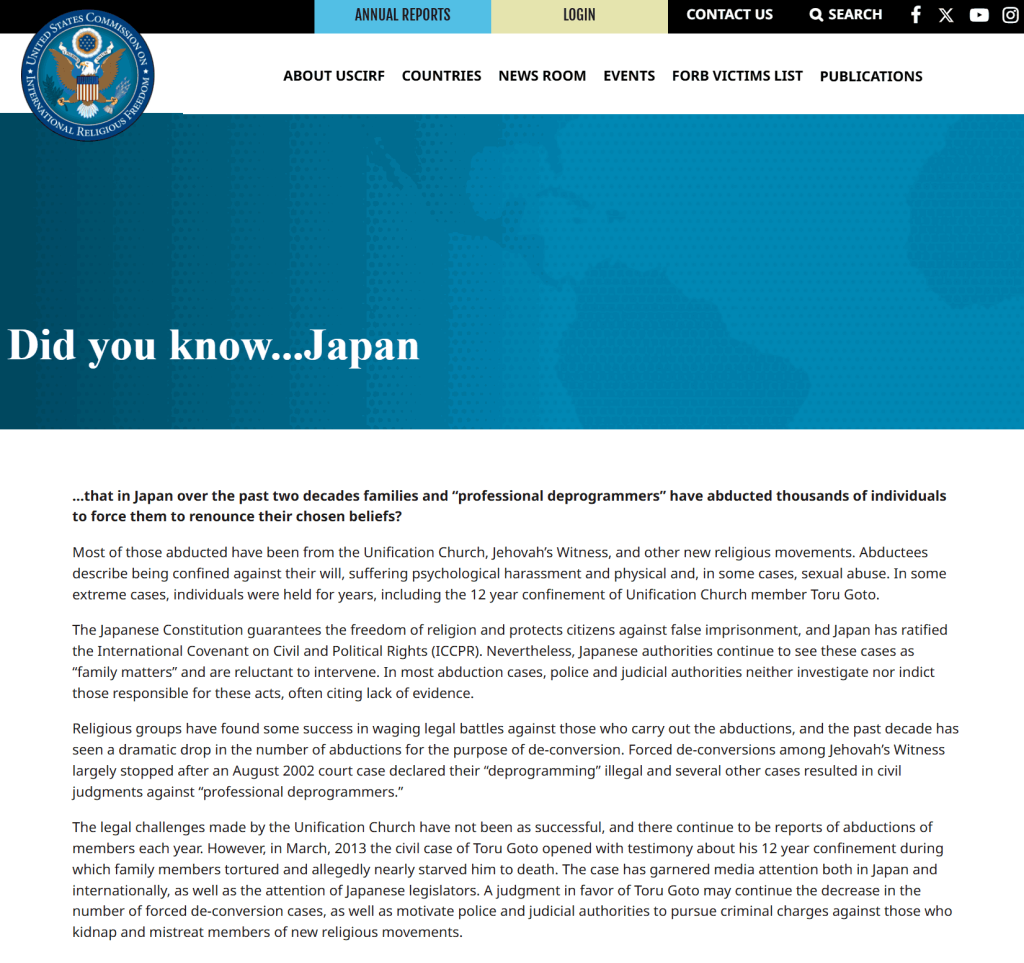
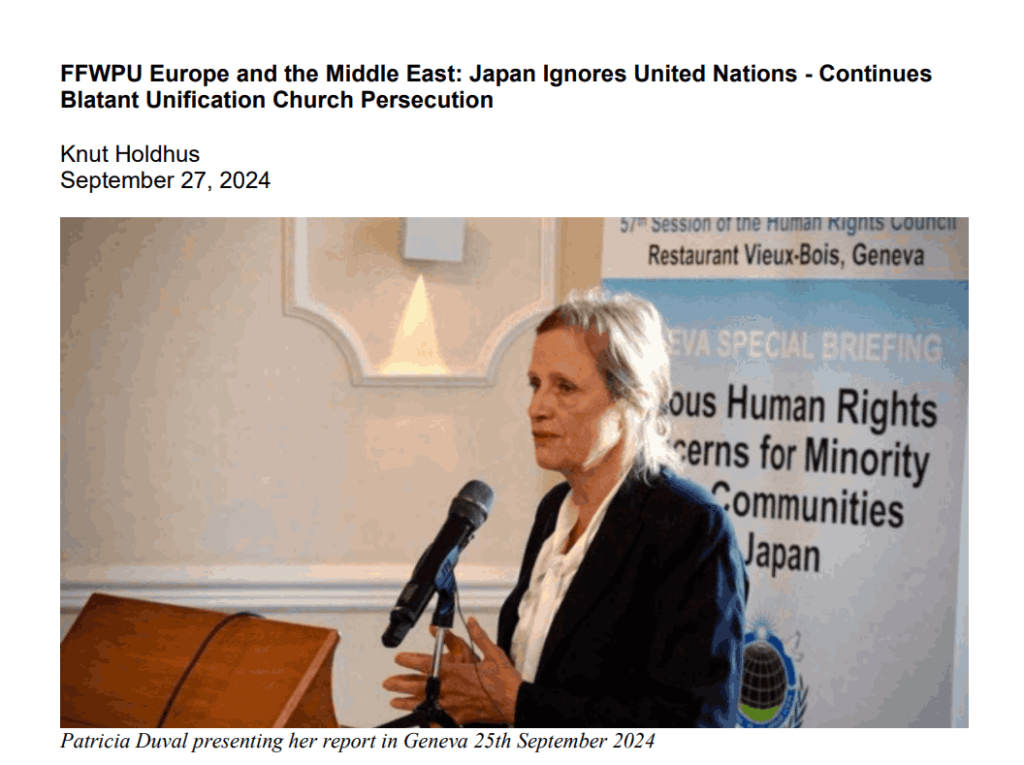
As of 2012, human rights organizations reported approximately 4,000 victims in Japan among followers of the Unification Church and Jehovah’s Witnesses who were abducted, illegally detained, and subjected to deprogramming for days, weeks, months, and sometimes even years in an effort to force them to renounce their faith. Their abductors and those involved in the deprogramming were not held accountable for their actions.
One of the most prominent cases that gained international attention was the incident involving Mr. Toru Goto who was abducted for his beliefs and held captive for 13 years, during which he was subjected to torture by professional faith breakers — deprogrammers.
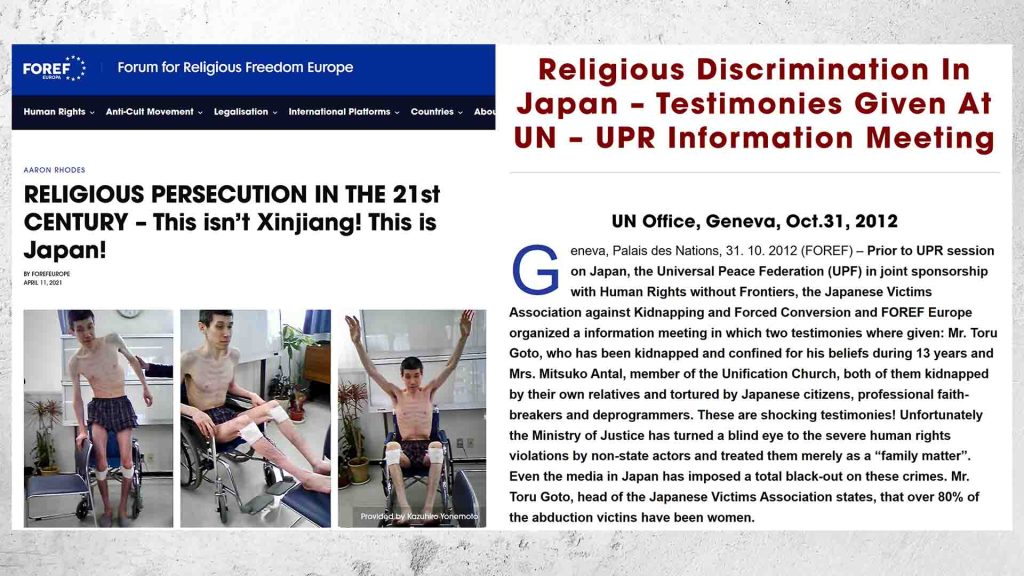
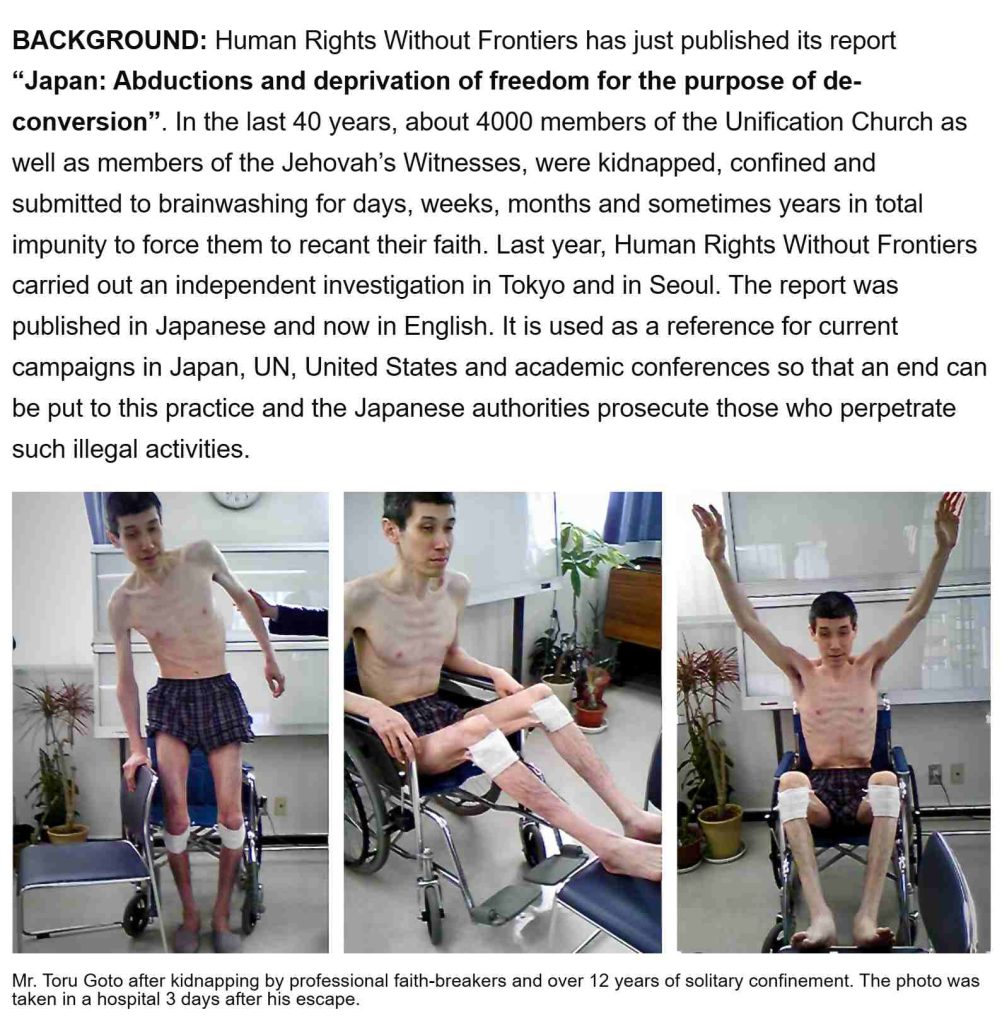
During his confinement, Toru Goto was subjected to cruel treatment, including starvation. In June 2008, following his release, he filed a criminal lawsuit against those involved in his detention. On December 9, 2009, the prosecutor’s office declined to initiate a criminal case due to a lack of evidence. Notably, similar decisions by prosecutors regarding individuals who were unlawfully abducted and subjected to forced deprogramming have been made repeatedly. Moreover, according to statements from the deprogrammers themselves, there have been documented cases of direct collaboration with them by certain police officers 9.
Below is an excerpt from the report “Japan: Abduction and Deprivation of Freedom for the Purpose of Religious De-conversion” (HRWF), which confirms the involvement of certain politicians in this illegal activity.
“Kozue Terada told Human Rights Without Frontiers:
‘On the morning of October 29th, 2001, my uncles and younger sister left the apartment for work, and three people, my father and two aunts, remained to keep watch over me.’
‘…At 2:00 pm on 30 October, Rev. Takazawa came to the room. Ignoring my desires, he continued to force me to have a dialogue with him. I said, “I don’t want to be here! I am going to call the police. Let me borrow a cell phone!” As I extended my hand, Rev. Takazawa got emotional and said, “Even if a policeman comes, as soon as he finds it is about the Unification Church, he will collaborate with me, saying ‘Keep on your good work!’” Rev. Takazawa took five to six name cards of policemen from his wallet, and emphasized, “I have a connection with the police’.”
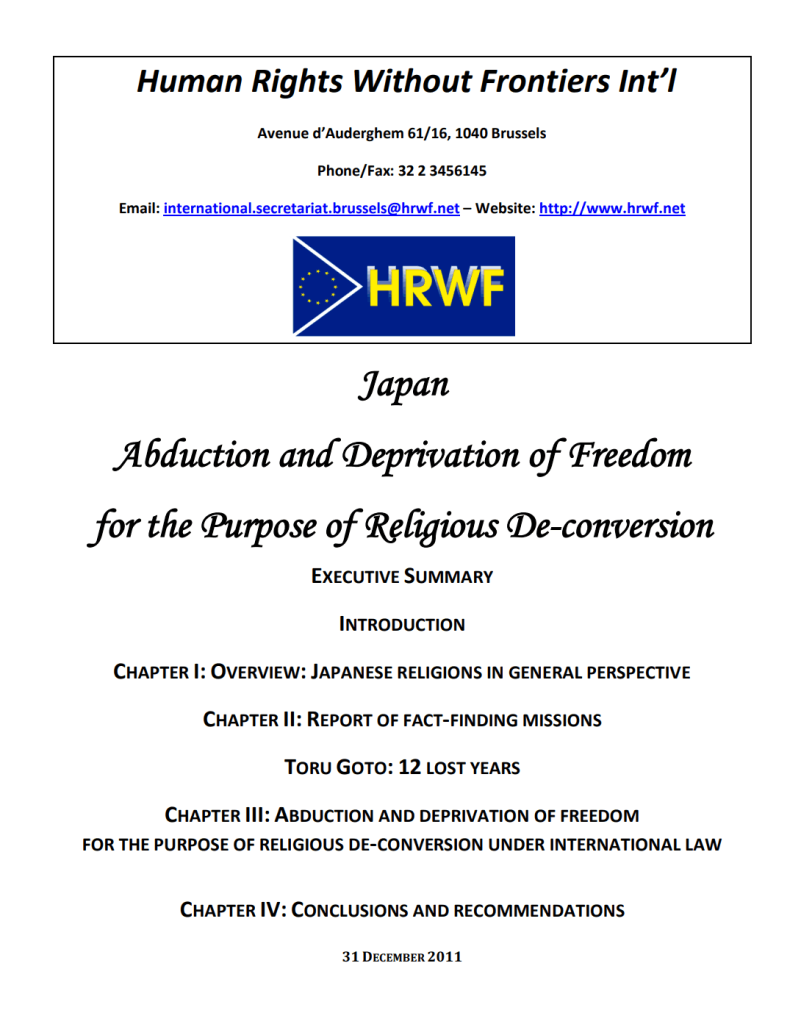
The phenomenon of deprogramming represents a form of anticult activity where the interests of the relatives of future deprogramming victims intersect with certain representatives of anticult organizations that offer their services in this field and charge exorbitant fees for them. Initially, the process of forced religious conversion, known as deprogramming, originated in the United States. Many American deprogrammers, despite their criminal past, continue to operate within the anticult environment to this day.
American deprogrammers and anticultists and their influence on South Korea and Japan
Some of the leaders in deprogramming in the USA are Rick Ross and Steven Hassan. These deprogrammers continue to operate not only in the United States, but also influence the international community by attending various international conferences and symposiums, as well as collaborating with numerous anticult organizations and individual anticult activists from different countries.
For example, the website of the Cult Education Institute 10 — the official website of American deprogrammer Rick Alan Ross — provides some details about Ross’s international activities, including his connections with Japan 11.
“Rick Alan Ross is one of the leading experts on cults in the world today. He has consulted with the FBI, the BATF, and various other law enforcement agencies, as well as the governments of Israel and China, on the topic of cults. He has been qualified and accepted as an expert court witness in eleven different states, including the US federal court. He has also worked as a professional analyst for CBS News, CBC of Canada, and Nippon and Asahi in Japan.”

The influence of American deprogrammers on other countries is also shaped by their collaboration with key umbrella anticult organizations. In particular, Rick Ross and Steven Hassan have platforms to promote their resources through two major anticult networks: the American ICSA and the European FECRIS. Additionally, the literature of some American anticult activists is translated into various languages, serving as an additional source for disseminating knowledge and methods of anticult efforts worldwide. For instance, the books of American anticult activist Janja Lalich have been translated into several languages, including Japanese and Korean, as noted on the ICSA profile pages 12.
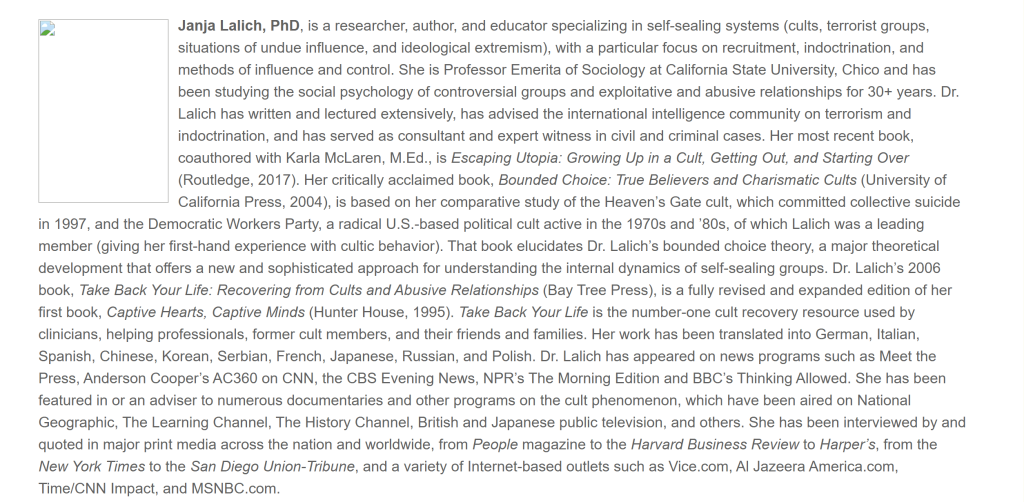
It’s important to mention that Janja Lalich holds a key position in the American anticult organization ICSA and the European FECRIS. She has been noted for her collaboration with Steven Hassan, and also attended an informal meeting with a group of European anticult activists led by the head of the Russian pro-religious organization RACIRS, Alexander Dvorkin, in 2018 in Riga, as previously mentioned in the article “Russian Anticult Lobby in British Media. How BBC Experts Serve the Russian RACIRS.”
The anticult organization ICSA has long served as a platform for connections among anticultists from different countries. Among the list of anticultists featured on the ICSA profile page, representatives from South Korea and Japan are noteworthy.
- South Korea: Chae Young Kim; Ji-il Tark, PhD.
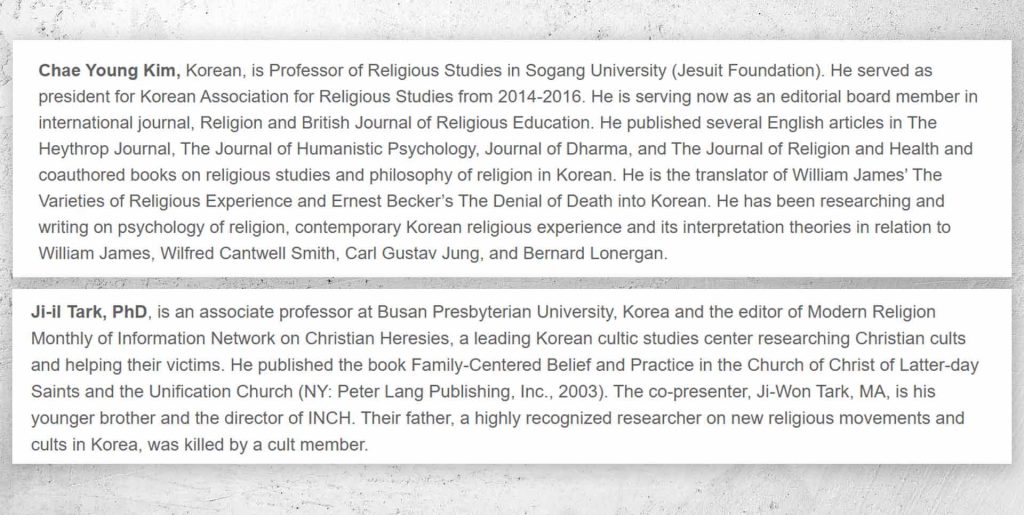
Chae Young Kim, Korean, is Professor of Religious Studies in Sogang University (Jesuit Foundation). He served as president for the Korean Association for Religious Studies from 2014-2016. He is serving now as an editorial board member in international journal, Religion and British Journal of Religious Education. He published several English articles in The Heythrop Journal, The Journal of Humanistic Psychology, Journal of Dharma, and The Journal of Religion and Health and coauthored books on religious studies and philosophy of religion in Korean. He is the translator of William James’ The Varieties of Religious Experience and Ernest Becker’s The Denial of Death into Korean. He has been researching and writing on psychology of religion, contemporary Korean religious experience and its interpretation theories in relation to William James, Wilfred Cantwell Smith, Carl Gustav Jung, and Bernard Lonergan.
Ji-il Tark, PhD, is an associate professor at Busan Presbyterian University, Korea and the editor of Modern Religion Monthly of Information Network on Christian Heresies, a leading Korean cultic studies center researching Christian cults and helping their victims. He published the book Family-Centered Belief and Practice in the Church of Christ of Latter-day Saints and the Unification Church (NY: Peter Lang Publishing, Inc., 2003). The co-presenter, Ji-Won Tark, MA, is his younger brother and the director of INCH. Their father, a highly recognized researcher on new religious movements and cults in Korea, was killed by a cult member.
- Japan: Yoshihide Sakurai, PhD; Hiroshi Yamaguchi, Esq; Takashi Yamaguchi, Esq; Ms. Yukari Yamamoto; Masaki Kito, Esq; Kimiaki Nishida, PhD.
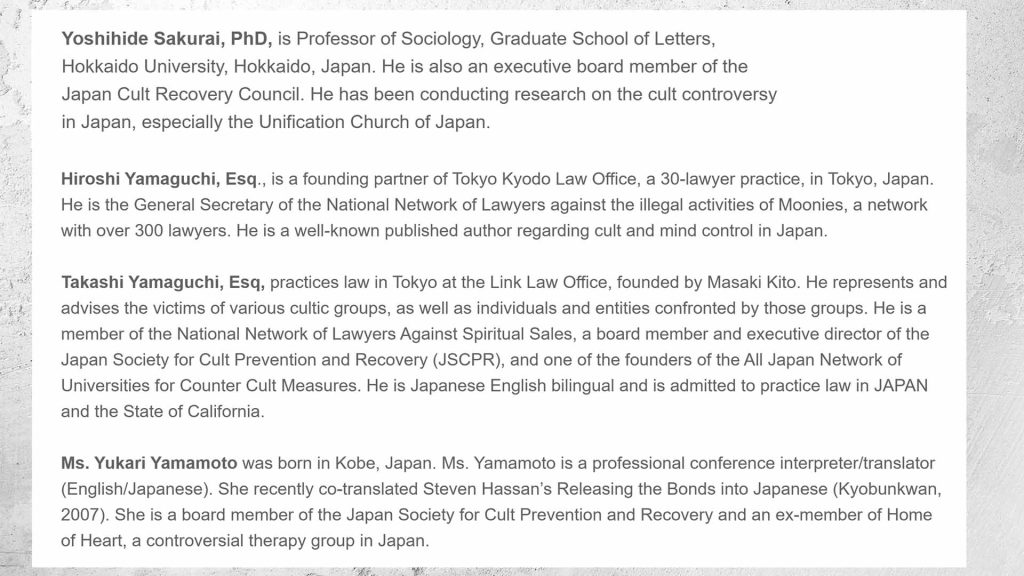
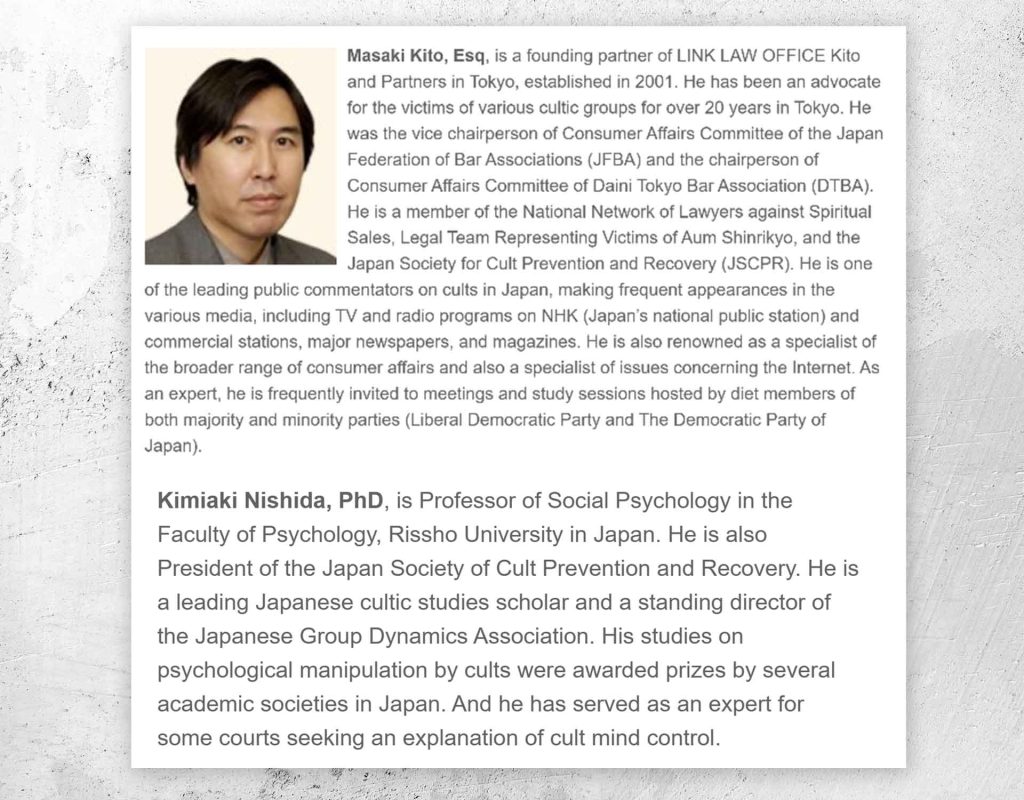
In addition to the direct anticult influence by American deprogrammers and anticult activists, a significant or rather even a key role in anticult activities in Asian countries has been played by fundamentalist conservative Christian churches. These churches accuse disfavored movements and organizations of “heresy” and “sheep stealing” and often resort to violence against their members. In particular, the conservative form of Korean Protestantism has served as a convenient platform for the activities of successors to the work of Walter Künneth (an anti-Semite, anticult activist, and Nazi ideologue), which has fostered an extreme degree of intolerance towards dissent and the promotion of supremacist ideologies, including Nazism, in this country.
Since in South Korea the process of forced religious conversion, that is, deprogramming, as well as anticult efforts in general, are carried out by Protestant pastors, let us turn to the characteristics of Korean Protestantism and to the individuals who have had a significant influence on Protestantism in this region.
Features of Protestantism in South Korea and its anti-heresy struggle
South Korea is a democratic country, but despite that, anti-democratic forces have found opportunities to operate within it (as in other democratic countries), finding fertile ground in the Protestant religion. Protestantism is the main Christian denomination in South Korea. In essence, it was supposed to serve as an example of adherence to Christian values and virtues. However, this dominant religious organization has introduced a tendency towards extreme intolerance of dissent and theological exclusivity into Korean religious society.
Protestant fundamentalism occupies a key position within Korean Protestantism, closely bordering on intolerance towards other religions. This has created conditions for the activities of anticultists who rely on intra-church anti-heresy organizations. Pastors of Korean Protestant churches involved in anticult activities have employed old methods of combating heresy, adapting and modifying them for the modern religiously pluralistic society. Essentially, the Protestant anticult movement in Korea, similar to the Western anticult movement, opposes dissenters, groups, and organizations with different belief systems and worldviews — anything that threatens their religious structures becomes a target of attack.
In South Korea, numerous Christian organizations have been documented as engaging in so-called anti-heresy efforts. At first glance, ordinary members of many such organizations appear to be unconnected, apart from their shared activities and the identical methods they employ, but only at first glance. Closer and more extensive connections can be found among the church leadership heading the dominant religious organizations in the Republic of Korea. The only distinction between Korean anticultism and that of the US, Russia, or Europe is that, instead of the dehumanizing labels of “cult” or “sect,” Korean pastors use the label “heresy,” which once again demonstrates the significant influence of Protestant fundamentalism.
Fighters against “heresy” and the exposure of their activities
Let’s take as an example two Korean anti-heretical activists 13:
“While Tak Myeonghwan’s original surveys were negative exposés of new religious groups, Rev. Choe Samgyeong was more theologically oriented and played an important role in heresy charges at denominational and interdenominational levels. He not only worked for the anticult monthly Church and Faith, but played a critical role in heresy charges on behalf of his Presbyterian Church (Tonghap) and the Christian Council of Korea. He belonged to the Presbyterian Church (Hapdong) and then moved to the Tonghap Church, where he became a staunch critic of Rev. Kim Gidong’s Berea Movement. He gained his reputation as a ‘heresy discriminator,’ feared by new religious groups because of his association with the largest Korean Protestant denomination (the Tonghap Church) and the Christian Council of Korea (the largest evangelical association in the country).”

Regarding individuals such as Samkyung Choi and Myunghwan Tak, an interesting fact about their exposure comes to light. Here is an excerpt from an article that references the exposure of Samkyung Choi and a recording of his phone conversation with Tak Myunghwan:
“‘Samkyung Choi is a blasphemer and heresy fabricator,’ the article says. ‘The phone conversation between Samkyung Choi and the late Myunghwan Tak, President of the International Religion Affairs Institute, was publicly exposed. Both the persons involved were secretly plotting to fabricate a scheme against former Senior Pastor of Pungkang Cheil Presbyterian Church, Pastor Yoonshik Park, as a heretic. Their phone conversation was recorded and openly exposed. The conversation says that in order to announce Pastor Yoonshik Park as a heretic, they would instigate public opinion through press reports and seminary students’ demonstrations and then appeal to the Presbytery Assembly to arrange for him be announced as a heretical leader’.”
The article also highlights another noteworthy point. Accusations of heresy have become a rather profitable business for some pastors. A bribe, as well as its amount, determines whether the largest Christian denomination in Korea recognizes you or labels you a heretic 15, 16.
“Pastor Inkang Lee ministering to the Amen the Faithful Church stated that a Korean religious magazine Church and Faith had requested a great amount of money in the form of a bribe from her — many tens to hundreds of millions in won (many tens of thousands to hundreds of thousands of US dollars) — in the name of solving a controversial matter involving her church within the Presbyterian Church of Korea (PCK).
For the last few decades, PCK (The Presbyterian Church of Korea) has caused its heresy examiners (in facto, ‘heresy fabricators’) to condemn dozens of pastors who belong to other denominations as heretical leaders. These pastors have been wrongfully and unreasonably accused as heretics by the largest denomination of the Korean churches without even being given a chance to defend themselves.”
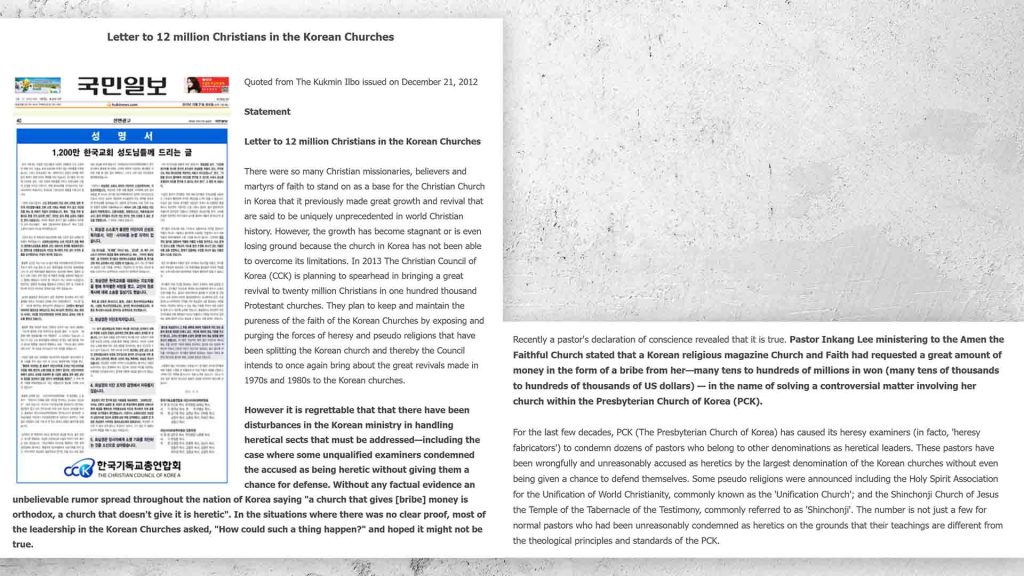
This is a representative example that conveys the true essence, goals, and methods not only of these “anticult fighters,” but of anticultism as a whole. It is regrettable that those who lack even a basic sense of morality and respect for people, their rights, and freedoms, under the guise of supposedly “protecting society,” have not only created a dishonest business for self-enrichment, but have also appointed themselves as arbiters of human destinies, destroying the lives of innocent people. They act as conduits of an ideology of superiority of some over others — essentially, Nazism — spreading rhetoric of hatred and intolerance within society and undermining democracy in their own countries.
It is noteworthy that, in an attempt to defend and distance themselves from the publicly revealed misconduct of their fellow believer Samkyung Choi (mentioned earlier), Protestant church organizations and many members of Korean anti-heresy Protestant movements accused him of heresy, similarly to his own “professional activities.” Suddenly, the “anti-heretic” became a “heretic” in the eyes of his own peers. The church’s opinion became divided: some defended him, while others actively opposed him. Interestingly, this opposition only began after the disclosure of Samkyung Choi’s unlawful activities, which brought shame to the church — something that had not been observed prior to the exposure.
Yung-Han Kim: anti-heresy rhetoric and the legacy of Peter Beyerhaus
On February 23, 2012, the Council of Christian Civic Organizations (기독교시민단체협의회는) in Korea held a public hearing on issues of heresy. Opinions were divided regarding the accused pastors, among whom was Samkyung Choi. As previously mentioned, Korean church denominations either defended or condemned them depending on their political interests. One of the key authorities in Protestant missiological theology who came to his defense, and more broadly to the defense of other fellow believers, was Professor Yung-Han Kim. His stance on the matter was covered by some news outlets 17. He condemned the decision of unionized church organizations in the case of the three accused, stating that it created grounds for division within the church and criticism of the church from society.
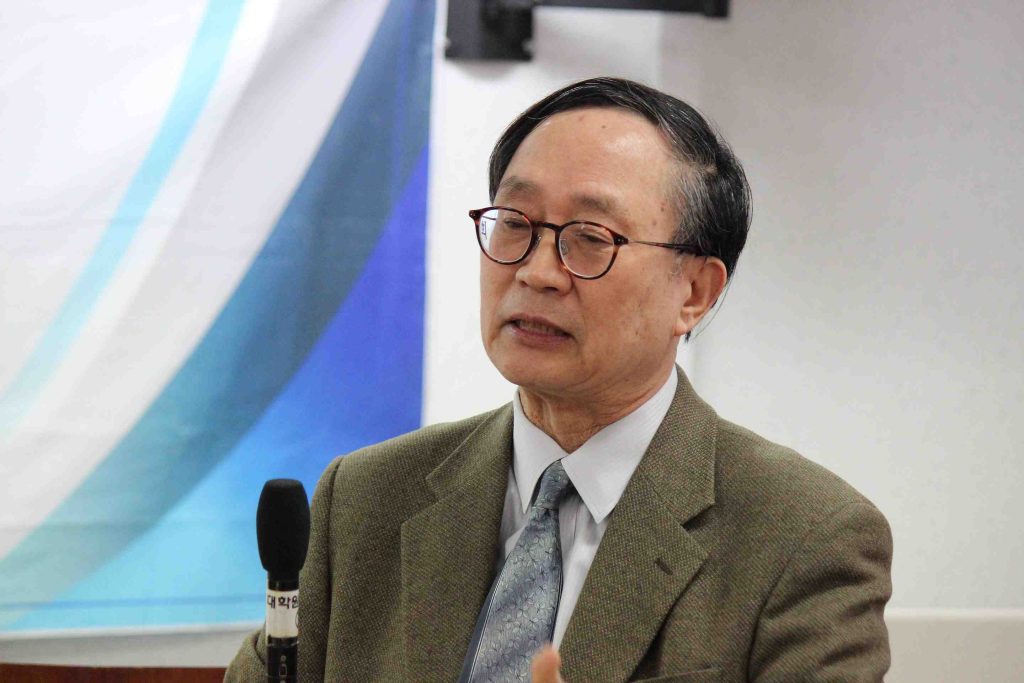
It’s important to note several points regarding those hearings involving the “heresy judges,” co-chaired by Professor Yung-Han Kim.
Yung-Han Kim condemned the public humiliation of pastors and the organizations to which they belonged in front of 9 million believers and Korean citizens. He interpreted the public accusations of those “heresy judges” as heretics as something that occurred merely due to the alleged “misinterpretation” of their words, as well as the presence of politically motivated factors. However, his seemingly well-intentioned rejection of the use of dehumanizing labels such as “heretic” and “heresy” applied solely to representatives of the dominant religion in Korea and did not extend to organizations previously branded by the “heresy judges,” such as the Unification Church (founded by Sun Myung Moon), Shincheonji (led by Lee Man-hee), and others. On the contrary, he referred to these organizations as “obvious heresies” and called for even stricter scrutiny of heretical ideas. He then urged the Korean Church to identify true heretics for the sake of its growth. In addition to condemning and labeling dissenters with the term “heresy,” another element of his anticult rhetoric should be noted, which is also observed among other proponents of anticultism — namely, the rejection of liberalism and religious syncretism, that is, of unity.
Who really is this defender of Protestant fighters against heresy and the uncompromising judge of “true heretics,” Professor Yung-Han Kim? He is one of the key theologians in South Korea, who played a decisive role in introducing Korea to German theologians on an academic level. In particular, Yung-Han Kim, in partnership with another theologian, Seung-Goo Lee, made a significant contribution to continuing the work of Peter Beyerhaus who at one time closely collaborated with the staunch opponent of sects and Nazi ideologist Walter Künneth, whom we have repeatedly mentioned earlier on this portal.
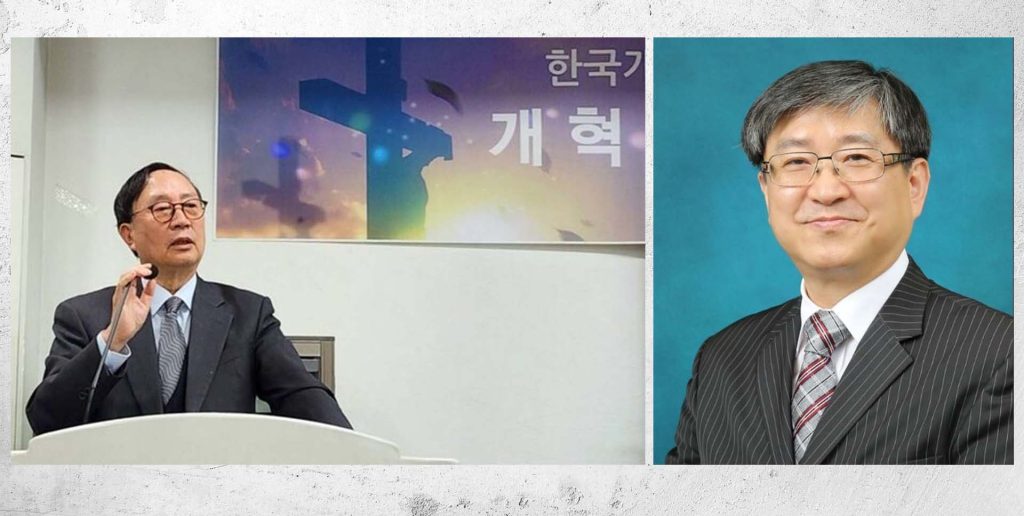
Before we move on to the personality of the second key successor to Walter Künneth’s work in South Korea, let us note another interesting fact regarding Samkyung Choi. For those familiar with the rhetoric of anticult leaders from Russia — Alexander Dvorkin and Alexander Novopashin (the president and vice-president of the Russian Association of Centers for the Study of Religions and Sects, or RACIRS) — this example of rhetoric from a Korean anticultist will evoke a sense of complete similarity 20.
“Pastor Samkyung Choi, who has been closely bound up with those contradictory affairs, made an incoherent and nonsensical statement saying that ‘it is better not to give the victims a chance to vindicate themselves,’ and subsequently deprived them of the right to defend themselves. He also said, ‘In examining and judging heretics and pseudo religions, especially in urgent situations in which the harm caused by those forces are serious and other churches must be urgently protected from them, the Heresy Handling Committee of PCK has never allowed the party that was said to be heretical or pseudo-religious to vindicate themselves. It is usual that questions are not presented concerning the explanatory vindications of the denomination the defendant belongs to.’ This is a typical act of arbitrary oppression of mega-sized denominations.”
Samkyung Choi was at one time affiliated with the Hapdong Presbyterian Church. The city of Hapdong is one of many anticult centers in South Korea, and this city is also associated with the aforementioned colleague of Yung-Han Kim, the Korean theologian Seung-Goo Lee. Since 2009 and to this day, he has been serving as a professor of systematic theology at the Hapdong Graduate School of Theology.
Seung-Goo Lee: anti-heretical rhetoric and the legacy of Peter Beyerhaus
Seung-Goo Lee is a professor at Hapdong Theological Seminary in South Korea. He was recognized as one of the most influential scholars in the field of Bible studies and theology in 2011 and has led key theological societies in Korea:
- President of the Korean Evangelical Theological Society (2020–2022);
- President of the Korean Presbyterian Theological Society and the Korean Reformed Theological Society.
- He founded the Korean Presbyterian Theological Society, the Korean Biblical Theological Society, the Korean Kierkegaard Society, and the Peter Beyerhaus Society.
- Since 2009, he has been serving as a professor of systematic theology at the Graduate School of Theology at Hapdong.
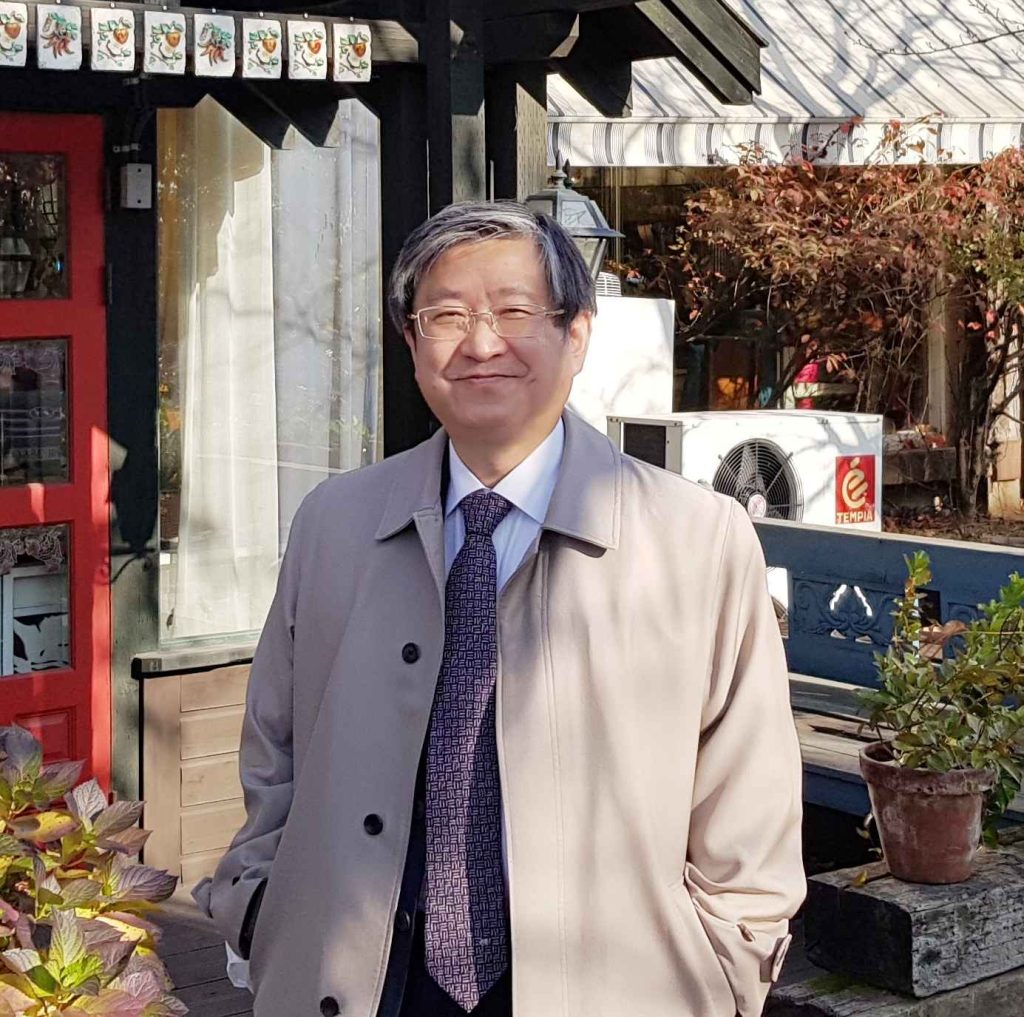
Professor Seung-Goo Lee has been noted for similar anti-heresy rhetoric. We refer to Professor Seung-Goo Lee’s article, “Heretics’ Rant, What Should the Korean Church Do?” targeting the Shincheonji movement 21. This movement is persecuted and discredited in many countries by representatives of the anticult movement and is dehumanized by them through the use of derogatory labels such as “sect,” “cult,” or “heresy.” The consequences of such informational anticult dehumanization and propaganda against this organization, which have led to the abduction of Shincheonji members for the purpose of deconversion, have already been mentioned above. In the aforesaid article, Shincheonji is portrayed as “heresy,” a “social problem,” and an obstacle to the dominant denominations in Korea.
“First, we must continue to declare to both inside and outside the church that Shincheonji’s teachings are heretical teachings that are not biblical. The problem is that there are many souls who continue to fall for false teachings. Therefore, we must clearly state that the doctrines of these heretics are distorted from the truth and are therefore significantly wrong.”
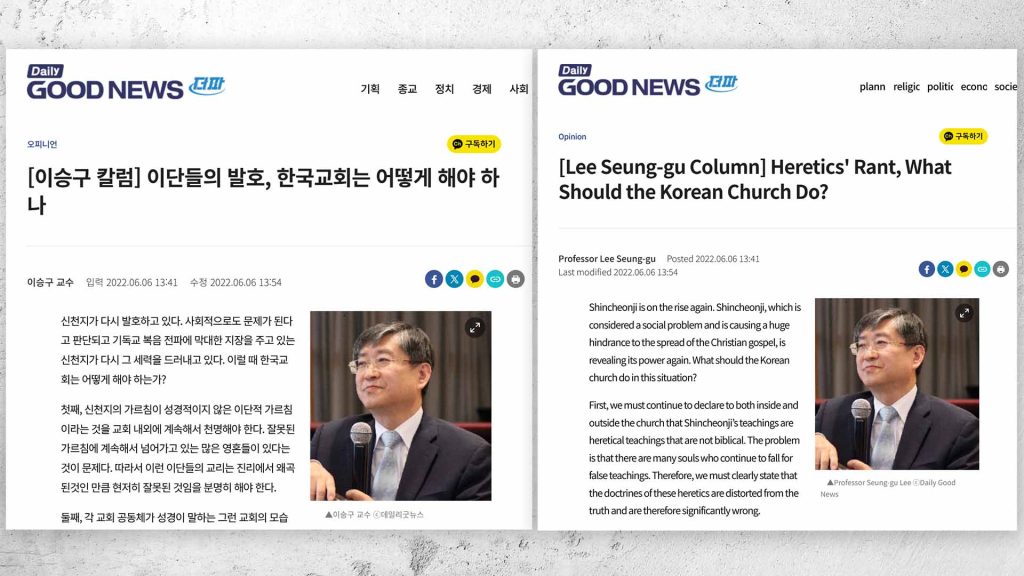
Seung-Goo Lee and Yung-Han Kim, along with several other Korean theologians and missionaries, became the founders of the Peter Beyerhaus Society in 2018.

Peter Beyerhaus Society in South Korea
Professor Yung-Han Kim, in his memorial essay 22 written in honor of Peter Beyerhaus, concluded the following regarding the founding of the Beyerhaus Society:
“On October 5, 2018, the Beyerhaus Society was organized in Korea. The only Korean doctoral disciple of Beyerhaus, Professor Dong-Ju Lee (retired from Asin University), took the lead and was launched with the participation of Professors Jong-Nam Cho, Myeong-Hyeok Kim, Sang-Bok Gib, Yung-Han Kim, Seong-Jong Oh, Seung-Goo Lee , and Pastor Jae-Hoon Lee.”
“Evangelical theologians in Germany and the United States, as well as the Korean Reformed Theological Society, the Korean Evangelical Theological Society, the Korean Christian Association, the Korean Evangelical Fellowship, and other later evangelical theologians, pastors, and missionaries who respect him [Beyerhaus] and agree with his ideas, wish to inherit and develop the great legacy of the evangelical biblical mission concept that he left behind,” — concluded Yung-Han Kim in the end.
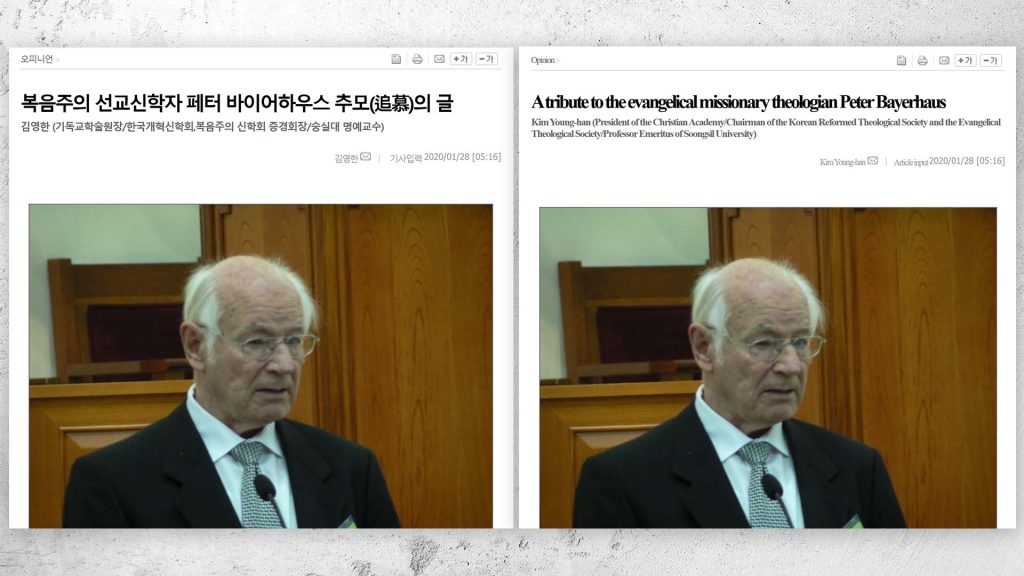
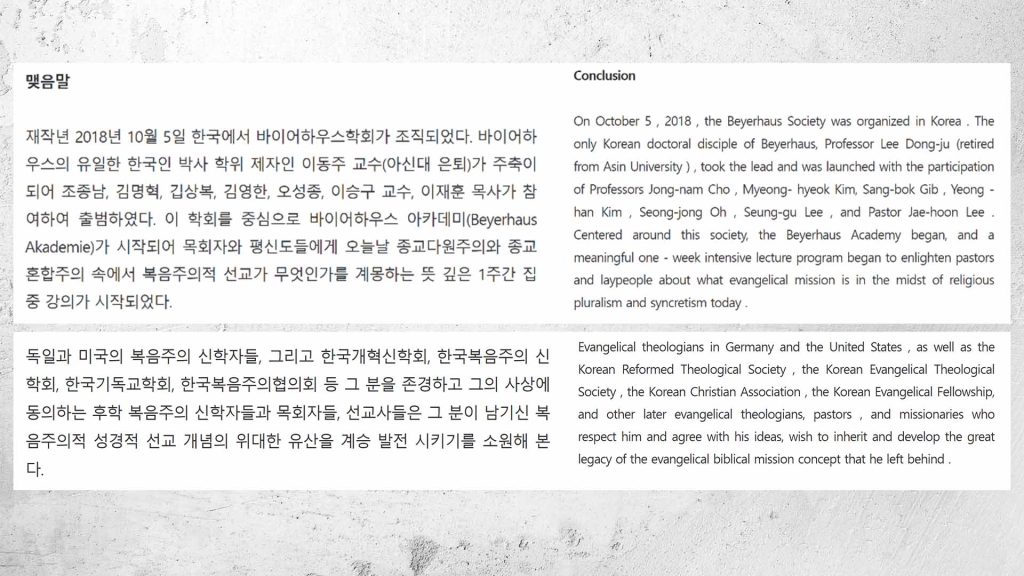
Peter Beyerhaus
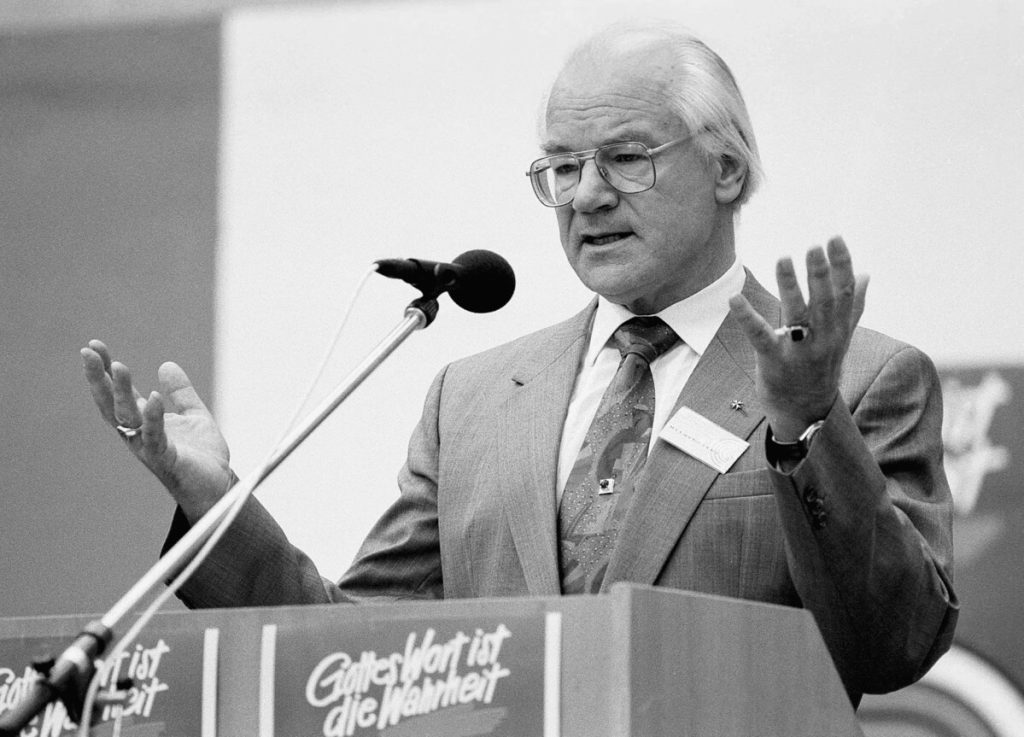
Peter Paul Johannes Beyerhaus was a German Protestant pastor and one of the leading evangelical missionary theologians 23. The collaboration between Walter Künneth and Peter Beyerhaus is mentioned in the book by church historian and professor at the United Theological College in Bangalore (India), T.V. Philip, titled “Edinburgh to Salvador: Twentieth Century Ecumenical Missiology,” Chapter 5: Ecumenical — Evangelical Polarity 24, 25.
“In 1975 there appeared in Germany a book entitled: ‘The Berlin Ecumenical Manifesto, on the Utopian Vision of the World Council of Churches,’ edited by Walter Kunneth and Peter Beyerhaus. The book attacked not only the World Council of Churches but also the Lutheran World Federation, World Student Christian Federation, certain Roman Catholic groups, the German Evangelical Kirchentag, Taizé, and to some extent even Lausanne. According to H. Berkof, the common thread through all the articles in the book was the desire to demonstrate that the World Council of Churches no longer sought to proclaim the Gospel throughout the world, but strove rather for a purely horizontal, social and political, humanization and unification of mankind by means of religious pluralism and syncretism. ‘Unwearyingly, the authors point out again and again that with such a program the World Council of Churches is on the way to Anti-Christ. They believe that the last days are just around the corner… and that in the decisive hour the World Council will stand on the sides of the enemies of Christ.”
Peter Beyerhaus left behind a significant generation of theologians he had mentored. While he was a professor in Tübingen, many Korean students earned their doctoral degrees under his guidance. One of them was Professor Lee Dong-Ju who invited him to Korea several times. In 1982, Peter Beyerhaus visited Korea, accompanied by his wife. Altogether, he visited the country 16 times, the last being in 2016. 26,27
![2016, South Korea. Peter Beyerhaus is in the middle of the front row [27] ⓒ Photo from “Christian Today” 크리스천투데이](https://actfiles.org/wp-content/uploads/2024/12/37-1024x540.jpg)
![2016, Dr. Peter Beyerhaus delivers a lecture at a seminar of the Christian Academy during his last visit to Korea [27]. ⓒ Photo from "Christian Today" 크리스천투데이](https://actfiles.org/wp-content/uploads/2024/12/38-1024x649.jpg)
![2013: Dr. Peter Beyerhaus (on the left) delivers a lecture [27] ⓒ Photo from "Christian Today" 크리스천투데이](https://actfiles.org/wp-content/uploads/2024/12/39-1024x682.jpg)
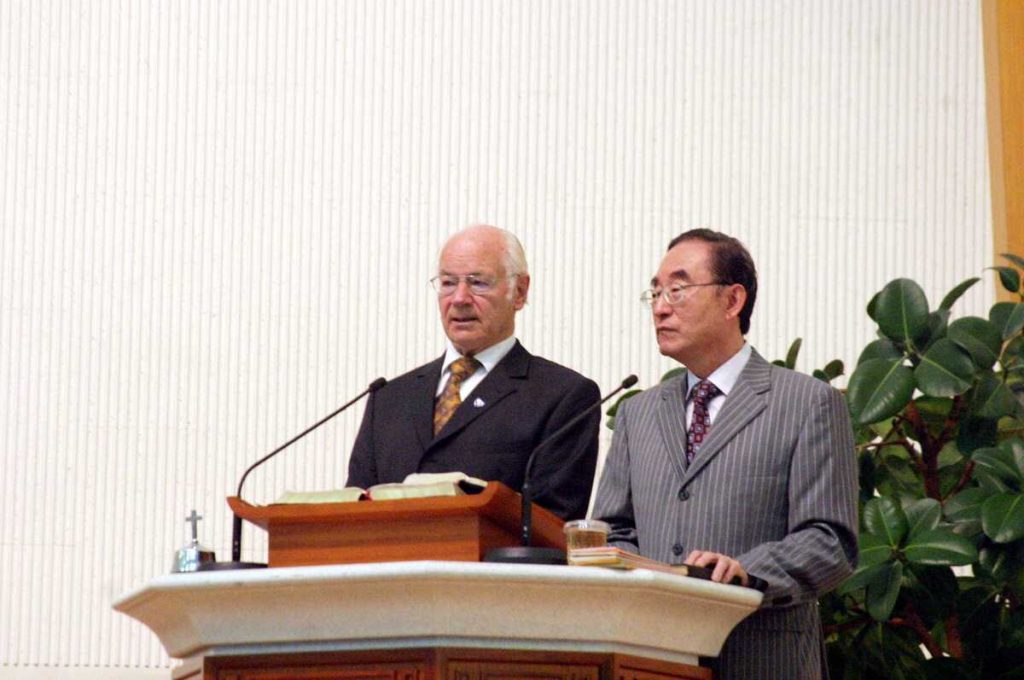
From Peter Beyerhaus’s speech at the congress in Korea 28:
“Why do I tell you this? What has this to do with our World Evangelization Crusade? A great deal, indeed! Because this Congress has been set up to charge each one of you with the task to be such a herald. This is my message to you tonight. You are heralds of Christ’s coming!”
Dr. Peter Beyerhaus, Professor of Missiology, University of Tübingen, West Germany. A Guest Instructor, Institute of World Mission of the East-West Center for Missions Research and Development, Seoul, Korea.
In this speech, Peter Beyerhaus also mentioned his visit to Thailand as part of promoting the Asian Mission: “A few weeks ago I attended the Consultation on World Evangelization in Thailand.”
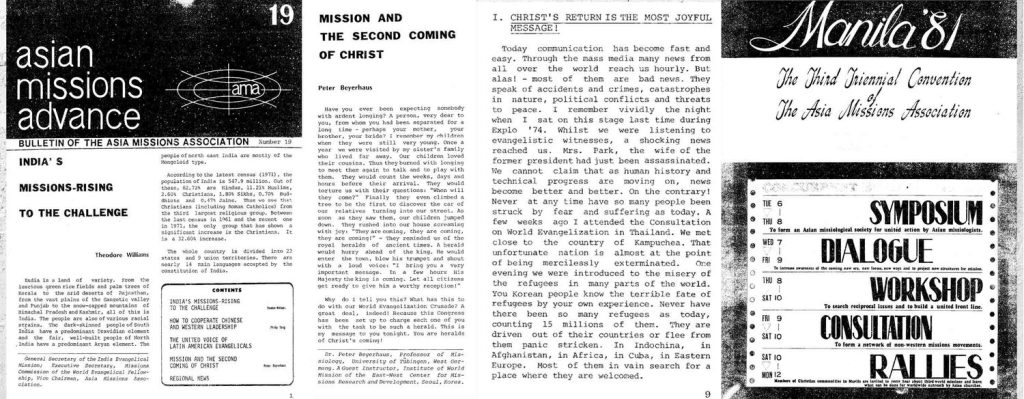
Peter Beyerhaus repeatedly participated in conferences of the Asia Missions Association 29, 30. This association includes 14 Asian countries, among them India, Korea, and Japan.
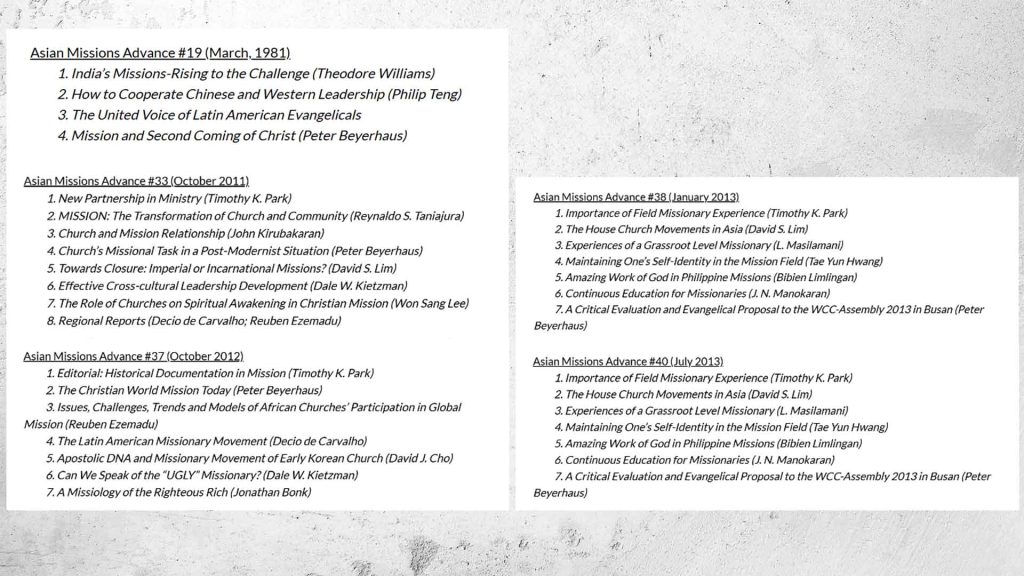
It is worth noting that Peter Beyerhaus’s missionary service was expressed in the spread of Christianity, the promotion of the Gospel, and the fight against heresies. However, the anti-heresy struggle in the radical form that has existed in recent decades in South Korea and, more broadly, in Asian countries, developed in conjunction with anticult influence from the West. This influence was partially mentioned at the beginning of this article when we were discussing the impact of American anticultists on Asian regions. Let us also consider the Eastern missionary work of other followers of Walter Künneth — Friedrich-Wilhelm Haack from Germany and Johannes Aagaard from Denmark.
Friedrich Haack and Johannes Aagaard and their missionary contribution to Southeast Asia region
Let’s recall the line of succession that played a key role in global anticultism, which was carried out through the chain “Künneth — Haack and Aagaard — Dvorkin.” We have written about this repeatedly. An additional line of succession in Künneth’s work was examined in this article. It can be outlined as “Walter Künneth — Peter Beyerhaus — Yung-Han Kim and Seung-Goo Lee.” It is noteworthy that these two lines are absolutely interconnected and are not separate or independent from each other. They are united not only by Künneth’s legacy, but also by certain spheres of influence, spanning from Germany and the United States to Asian countries. For example, Friedrich Haack led research expeditions to South Korea (1984), Japan, and India (1981). Johannes Aagaard conducted research expeditions to Japan, Nepal, Thailand, and China. The 1970s and 1980s are considered the “Indian period” in Aagaard’s life, while the 1990s are referred to as his “Buddhist period.” Both Friedrich Haack and Johannes Aagaard had a significant impact on the region of East and South Asia, as did the legacy of Peter Beyerhaus.
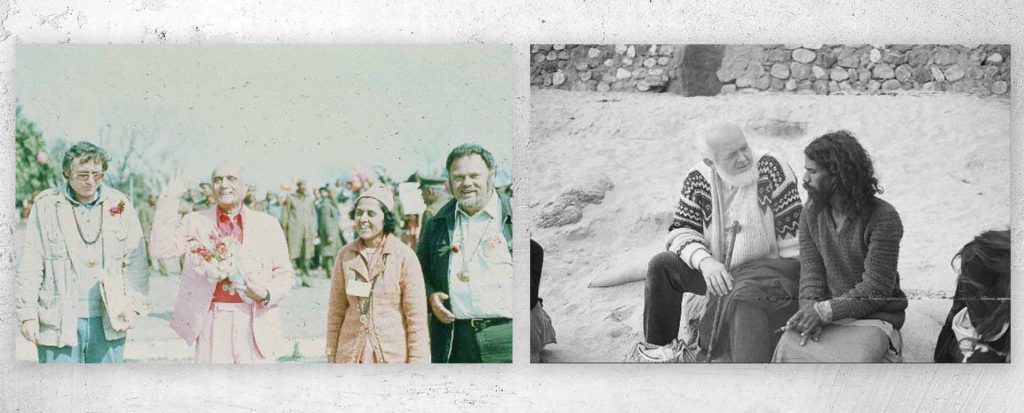
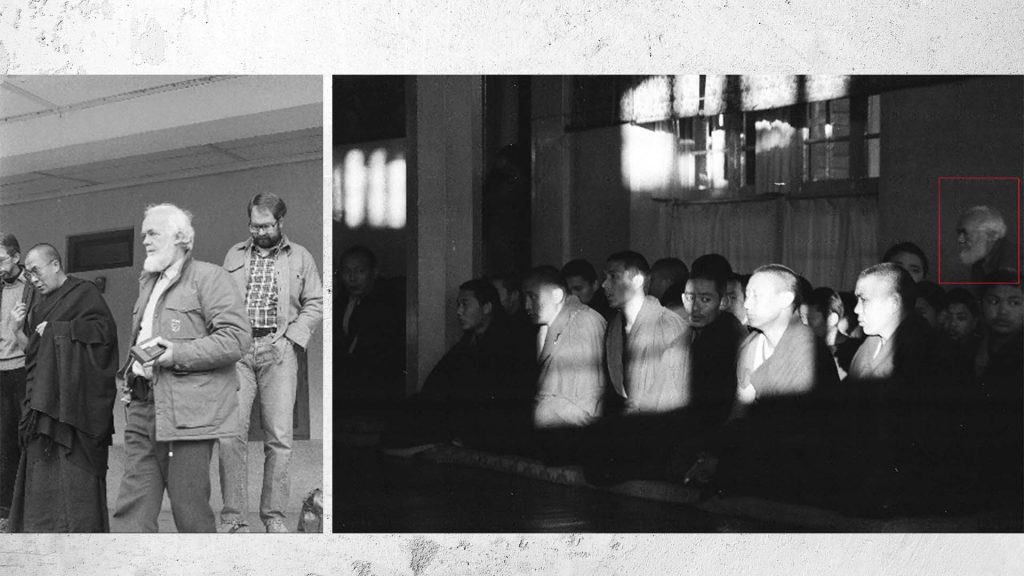
Conclusion
In this article, we examined the impact of the anticult movement and Walter Künneth’s legacy on the regions of South Korea and, to some extent, Japan, as well as on Southeast Asia as a whole. The tragic cases of forced deprogramming mentioned at the beginning of the article are merely a consequence of the presence of anticult force in these countries, which is the enemy of democracy and human freedom. Considering the number of deaths caused by attempts of forced religious conversion in South Korea and Japan, the fundamental human right to life itself is at stake.
The international community has repeatedly advocated for the protection of deprogramming victims in these countries, exposing blatant violations of human rights and freedoms by Protestant pastors-deprogrammers. However, insufficient attention has been paid to the root causes of religious intolerance and violence in that region, which have led to such inhumane cases of abduction and attempts at forced deprogramming.
The issue of informational ideological influence and religious propaganda, as well as the facts of dehumanization and stigmatization, must not be underestimated by the public. Behind every action lies someone’s words, and behind every word there is a certain ideology. To truly address the problem of religious intolerance, hatred and violence, it is necessary to thoroughly examine the entire network of anti-heresy and anticult efforts: from pastors-deprogrammers to missionaries and theologians calling for a crusade of evangelization. Only in this way can the source of hatred and supremacy be identified — the hidden mouthpiece of an ideology that promotes the superiority of some people over others: the mouthpiece of Nazism.
When someone is branded with a dehumanizing label, whether it is “cult,” “sect,” or “heresy,” it essentially means only one thing — Nazism, belittling of some people and elevation of others. Such a supremacist ideology is incompatible not only with a democratic world and human dignity, but also with the essence of Jesus Christ’s peaceful teaching which everyone who calls themselves Christians, including Protestant pastors, should follow. However, observing the results of years of activity by members of prevailing denominations in Asian countries raises the question: will they be able to abandon religious intolerance and violence, cloaked as a “return” of “lost sheep” to the “fold of the church,” and start preaching their religion peacefully, through personal faith and example? In this case, the answer to this question will depend on who they truly follow.
Sources:
1. https://hrwf.eu/wp-content/uploads/2020/03/Shincheonji-and-Coronavirus-in-South-Korea.pdf
2. http://www.jesus114.net/
3. https://www.jesus112.net/instructor/
4. https://muntingnayon.com/105/105405/index.php
5. https://www.tparents.org/library/unification/talks/feffermn/Fefferman-DeprogJapan.htm
6. https://www.uscirf.gov/publications/did-you-knowjapan
7. https://www.tparents.org/Library/Unification/Talks2/Holdhus/Holdhus-240927.pdf
8. https://foref-europe.org/blog/2021/04/11/religious-persecution-in-the-21st-century-this-isnt-xinjiang-this-is-japan/
9. https://web.archive.org/web/20230726021832/https://hrwf.eu/wp-content/uploads/2018/08/2012-Report-Japan.pdf
10. https://culteducation.com/contact-us.html
11. https://cultsinsideout.com/
12. https://web.archive.org/web/20180813074211/http://www.icsahome.com/elibrary/peopleprofiles
13. https://www.collectionscanada.gc.ca/obj/thesescanada/vol2/002/NR38219.PDF
14. https://en.namu.wiki/w/%EC%B5%9C%EC%82%BC%EA%B2%BD#s-2
15. http://www.manmin.org/foreign/07_news/en/content.asp?id=2053&cat=cat_06&page=1
16. https://web.archive.org/web/20170331084726/http://www.christiantelegraph.com/issue19779.html
17. https://kr.christianitydaily.com/articles/67392/20121029/%EA%B9%80%EC%98%81%ED%95%9C-%EC%8B%9C%EB%A1%A0-%EC%9D%B4%EB%8B%A8-%EC%A0%95%EC%A3%84%EB%B3%B4%EB%8B%A4%EB%8A%94-%EC%84%A0%EB%8F%84%EA%B0%80-%ED%95%84%EC%9A%94.htm
18. https://en.wikipedia.org/wiki/Yung-Han_Kim
19. https://en.wikipedia.org/wiki/Seung-Goo_Lee
20. http://www.manmin.org/foreign/07_news/en/content.asp?id=2053&cat=cat_06&page=1
21. https://www.goodnews1.com/news/articleView.html?idxno=409147
22. http://www.newspower.co.kr/45147
23. https://en.wikipedia.org/wiki/Peter_Beyerhaus
24. https://www.religion-online.org/author/t-v-philip/
25. https://media.sabda.org/alkitab-2/Religion-Online.org%20Books/Philip%2C%20T.V.%20-%20Edinburg%20to%20Salvador%20-%20Twentieth%20Century%20Ecum.pdf
26. https://www.christiandaily.co.kr/news/70431
27. https://www.christiantoday.co.kr/news/328388
28. https://www.asiamissions.net/wp-content/uploads/2015/08/AMA19.pdf
29. https://www.asiamissions.net/about/history/
30. https://www.asiamissions.net/asian-missions-advances/archives/

